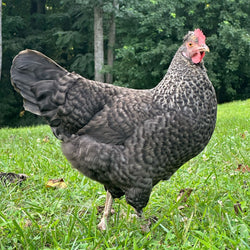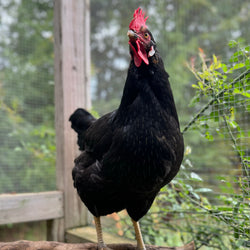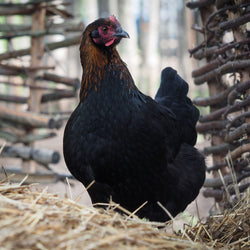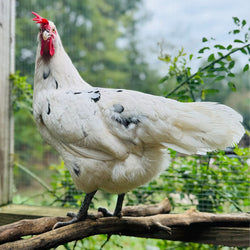page=5/--
Frequently Asked Questions
Here we answer the most commonly-asked questions about ordering, chicken care, and more.
How can I get my brooder to 95 degrees?
First remember that it only needs to be 95° directly under the heat lamp, and only in their first week of life. (You'll be reducing the temperature of the warmest area of your brooder by about 5° every week until they're acclimated to room temperature.) They will go to the "warm" area of your brooder to hang out and get cozy when they're cold. But it's also important to have areas that they can get away from the heat lamp if they're hot! So the best way to adjust your brooder temperature is to get it to 95° under your...
Read MoreWhy is my chick's beak getting crooked, and what should I do?
Usually, chickens with crossed beaks or scissor beaks lead long, normal lives. In most cases, this defect is caused by the chick positioning herself incorrectly for hatching. Normally, one wing will shelter the head inside the shell. But if a chick doesn't have her wing positioned over her head, the skull can malform, and it will reveal itself within the first few weeks as a cross beak or scissor beak as she begins to grow. What causes this problem isn't fully understood. Think of it as sort of the chicken equivalent of a breech birth: the chick has just not...
Read MoreOne of our chickens is not laying in the nest box. Is this common, and what should I do?
Don't worry, it's common for hens to not lay in the nest box! "Floor eggs" are nothing to be too concerned about. Having your hens laying eggs on the floor rather than in the nest can be a pain in the neck. You want to be able to easily find all the eggs laid so you can gather them freshly--and you don't want to accidentally step on a floor egg! Some hens even lay eggs under the roosting area, which is just gross, because then the eggs get pooped on in the night. Having your eggs in a dark nest...
Read MoreI took care of an issue with feather loss in my flock, so why haven't my chickens' feathers haven't grown back?
Not necessarily. Sometimes hens will regrow feathers immediately, and sometimes they won't regrow missing feathers until the molt (usually in the late summer or fall). The best layers are usually using all their resources to produce eggs, rather than to regrow feathers. That means high-production layers are generally the types that may not refeather immediately. To help your birds regrow missing feathers, you may consider getting a higher protein feed for a while; they need lots of protein to grow healthy feathers!
Read MoreSometimes my hens' waterer gets algae in it--is there a better waterer?
Not that we know of. Algae grows in conditions of water with excess phosphorus or fertilizers in it, and growth is encouraged when the water is also in the sun. It isn't related to the type of waterer you use, although it's possible you might get a bit less algae with an opaque waterer, if the sunlight is blocked from hitting the water. To avoid excess algae, put your waterer out of the sunlight and evaluate the condition of your water. Adding a little vinegar to the water to acidify it can discourage algae growth, but won't help much if...
Read MoreHow can I maintain a clean, enclosed run if I can't free range my birds?
Due to the number of predators in some rural areas, some pet chicken owners don't allow free ranging. Other times, an enclosed run in a small suburban yard is the only way to keep chickens safe and contained so they don't run into traffic or make themselves the target of neighborhood dogs. The problem can be that the chickens quickly forage all the green out of their run, and then droppings accumulate on the hard dirt. Cleaning can be difficult, because moist droppings do not rake up too well. In these situations you may want to try adding some bedding....
Read MoreIs bumblefoot contagious?
First, we're sorry that your flock is having problems with bumblefoot! The more technical name for this problem is ulcerative pododermatitis, but most people, amateurs and professionals alike, refer to the problem by the common name of bumblefoot. Bumblefoot is a serious problem, but it's not contagious in the way a cold is contagious. Still, read on because it's also true that you may sometimes have chronic issues with bumblefoot in a flock---and there are still some causative factors you may be able to address if you are having frequent problems with bumblefoot in your flock! First, call your vet...
Read MoreWhy aren't my young chickens interested in their nest box, yet?
Your chickens will probably not be interested in the nesting boxes until it is time to lay. Even then, it may take them a while before they understand what nest boxes are.Some breeds are good about finding nesting boxes very quickly. For instance, Rhode Island Reds and Speckled Sussex are always very good about laying in their nest boxes from the start. By contrast, we find Easter Eggers took longer. And Silkies often refused nest boxes, instead laying eggs in the bedding in a dark corner of the coop. Keep in mind that your Orpingtons may not begin laying eggs...
Read More







"The Clubhouse" Coop
Easy to assemble and built to last, the Clubhouse Coop is the perfect starter coop for a small flock.











